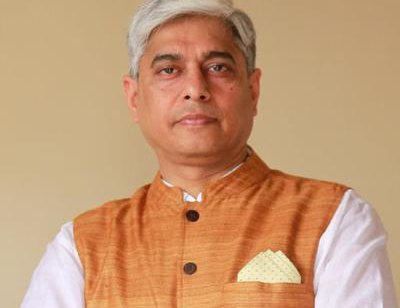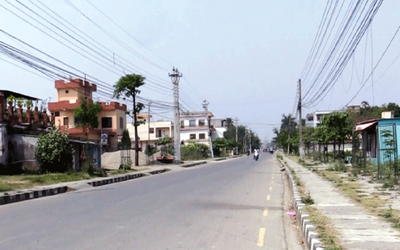
As Nepalese Prime Minister K.P. Sharma Oli is in China tour, spokesperson of External Affairs Ministry India Vikas Swarup replies various questions raised by Indian journalists regarding the visit of Nepalese prime minister to China in regular media brief in Indian capital New Delhi. Excerpts:
Nepal’s Prime Minister K.P. Sharma Oli is in China. He has been given red carpet welcome there and there have been 10 agreements that include transit and trade treaty as well as railway, making of international airport in Pokhara and many things. After Prime Minister Oil came here to New Delhi and there were several such agreements in Delhi also, do you think that it is a challenging situation for India vis-à-vis China?
You know very well that our age-old ties with Nepal are unique and special; they are characterized by an open border, based on shared history, geography, culture, close people- to-people ties, mutual security and close economic linkages. Since you have raised connectivity issues, let me take this opportunity to inform you about our connectivity with Nepal. We have at present 26 Land Custom Stations with Nepal, of which 10 can handle commercial cargo trucks. Two Integrated Check Posts (Raxaul-Birgunj and Jogbani-Biratnagar) are under construction and two more (Sunauli-Bhairawa and Nepalgunj Road-Nepalgunj) will be undertaken in the next phase. Two rail links (Jogbani-Biratnagar and Jaynagar-Bijalpura-Bardibas) are under construction and three more (Nepalgunj Road-Nepalgunj, New Jalpaiguri-Kakarbitta and Nautanwa-Bhairawa) will be undertaken in the next phase. Insofar as roads are concerned, 605 kilometres of roads in Phase-I of the Terai Road Project are under construction of which 87 kilometres have already been built. Another 900 kilometres will be undertaken in the next phase. AnMoU on the Raxaul-Amlekhgunj petroleum pipeline was signed in August, 2015. The 600-megawatt Muzaffarpur-Dhalkebar transmission line was inaugurated last month and India, as you know, is already exporting 330 megawatts of electricity to Nepal.
Two thirds of Nepal’s global trade is with India, and over 90% of their third country exports/imports transit through India. Millions of Nepalese live and work in India, and hundreds of thousands criss-cross the open India-Nepal border every single day. Of course, Nepal as a land-locked country, is free to explore any practical option it wants. But our relations with Nepal have their own natural logic.
Now, we are not in the comparison business. And even if you are, do ask yourself, is there any other country in the world which can have the kind of relationship that Nepal has with India?
We have just had the visit of Prime Minister K.P. Sharma Oli. You heard himself state on record what his expectations were from that visit and how those expectations were more than fulfilled. I have nothing more to add beyond that.
This is about the Nepal Prime Minister’s visit. As you mentioned, India has a relationship with Nepal that no country can compare. But we see that the transit and transportation agreement that is signed is the first-ever between Nepal and China and this is right after the so-called blockade. Do you think that these two things have a linkage to each other and do you think that this is a signal from Nepal’s side?
I have already answered that question. As I said, as a landlocked country Nepal is free to explore any option that it wants, but no country can replicate the kind of relationship that Nepal has with India which is based on the logic of geography and very close people-to-people ties based on centuries of interaction and a very open border where million of Nepalis live and work in India. So, no other country can replicate that special and privileged relationship that Nepal has with India.
About SAARC summit, can you give some impression about what kind of discussions happened on connectivity related issues and how to increase trade? Any suggestions given from the Indian side?
Official Spokesperson: Basically we pursued connectivity issues. As you know, that has been one of the most important items on our agenda as far as SAARC is concerned. Two agreements which were close to finalization which could not be finalized at the last summit, we discussed those. We discussed the SAARC satellite project. Pakistan has decided to opt out of that satellite project. So, it cannot be a SAARC satellite. It will be called a South Asia Satellite.
I think discussions were very good, were very positive. I think there is a lot of sentiment that South Asia is one of the least connected regions in the world and that needs to be changed. Based on the tone and tenor of the discussions that we saw happen in Pokhara, I think the future outlook is good.
(Source: Ministry of External Affairs, Government of India http://www.mea.gov.in/media-briefings.htm?dtl/26563 )
- TANAHU HYDROPOWER PROEJCT: A Significant Achievement
- Apr 15, 2024
- AMBASSADOR HANAN GODAR: Sharing Pain With A Nepali Family
- Mar 30, 2024
- VISIT OF KfW AND EIB TO NEPAL : Mission Matters
- Mar 25, 2024
- NEPAL BRITAIN SOCIETY: Pratima Pande's Leadership
- Mar 24, 2024
- NEPAL ARMY DAY: Time To Recall Glory
- Mar 15, 2024
















